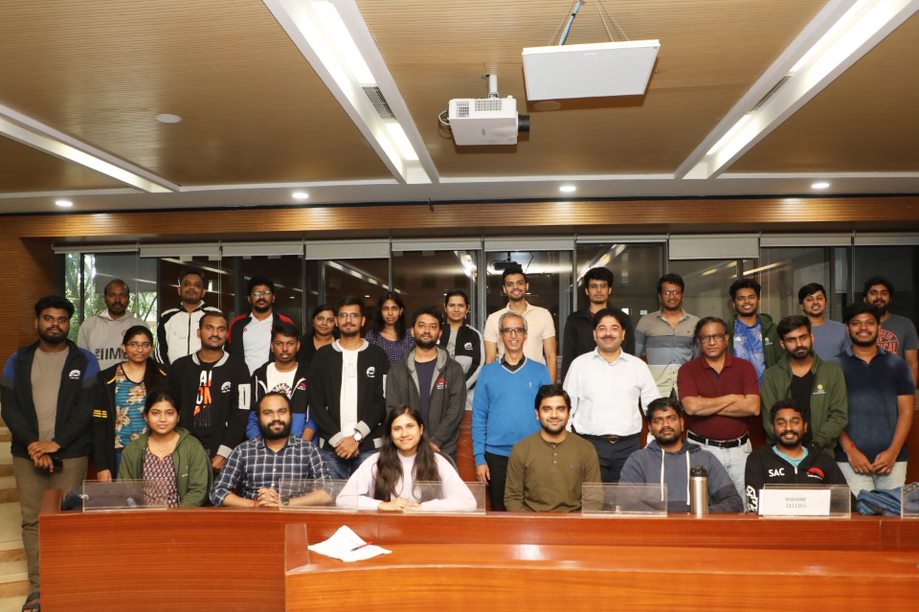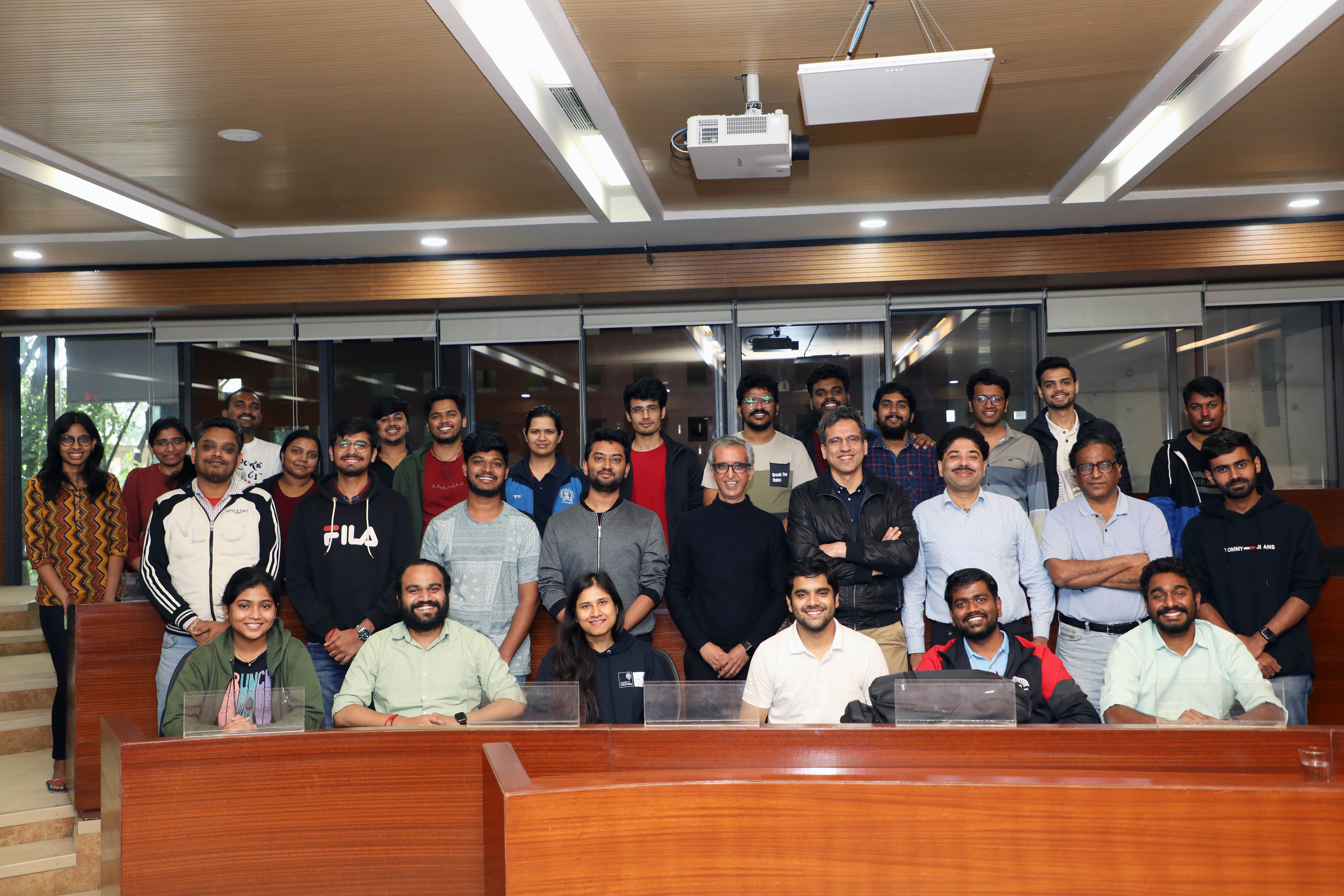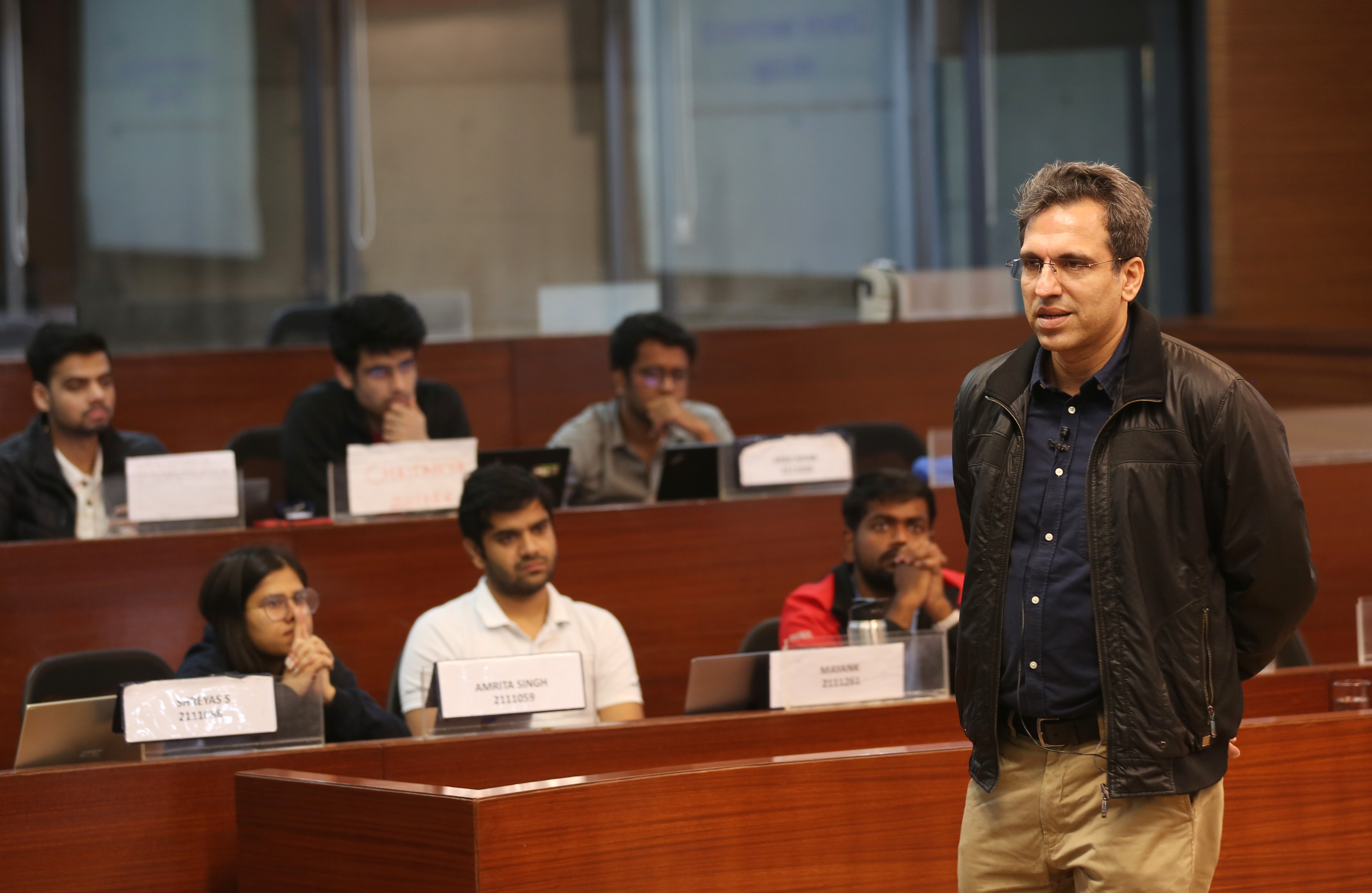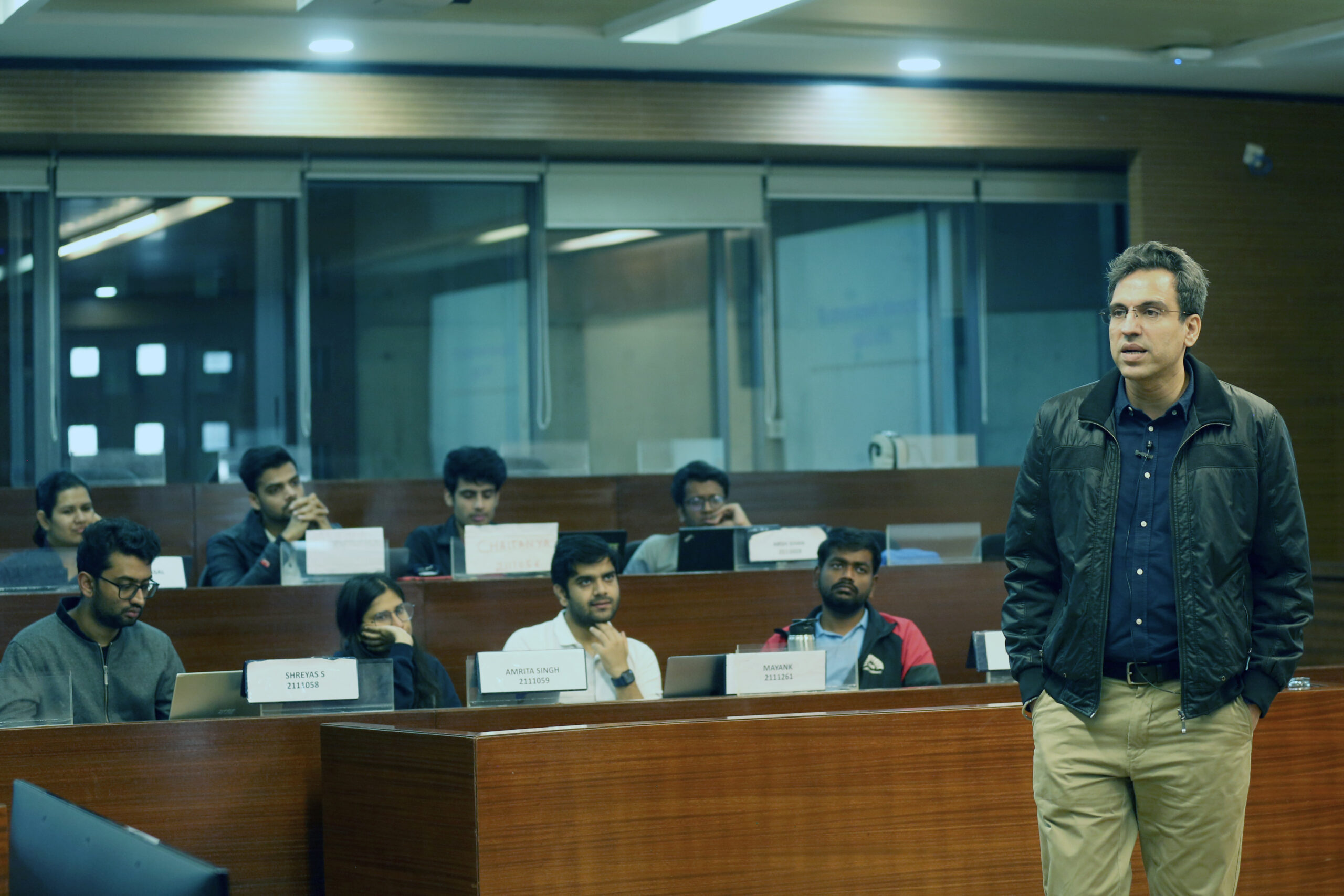Bringing industry back to the classroom – Pawan Sachdeva and classmates, PGP 1996
One of the strong points of an MBA programme at IIM Bangalore is its ability to infuse latest industry perspective into classroom teaching. And what better for a student when they gain this exposure from their own seniors who are now industry experts! This workshop concept was conceived by Pawan Sachdeva during one of his interactions with the institute. Mr. Sachdeva wears several hats, including that of an author, environmental activist, teacher, and investing expert. His guiding principle in life is to constantly reinvent yourself in order to escape the chains of routine.
He and six classmates from the PGP 1996 cohort introduced a credit-based workshop at IIMB. This theme-based class, “Investments: Practitioners’ Perspectives,” was provided as an elective to students. Anurag Saboo, Divya Sehgal, Hitesh Oberoi, Karthik Reddy, and Manish Gunwani were among his fellow instructors who took sessions at the workshop, about various elements of investing using varied business perspectives. This was a unique workshop held at the institution where alumni, subject matter experts in their domains, collaborated to create a credit-based elective program.
In this interview, Mr. Sachdeva discusses the development of this program, the work that went into its creation, his personal journey and much more.
Can you please tell us about yourself?

Between 1986 through 1990, I attended IIT Kharagpur and then worked for GAIL for four years. I began my studies at IIM Bangalore in 1994 and graduated in 1996. Our cohort had a diverse group of students, both with and without job experience, which made for a fascinating combination. After graduation, I went to work in the finance industry, primarily fund management.
I got the opportunity to engage with New York-based funds that launched an office in Singapore in 2006. In 2007, I relocated to Singapore. I ultimately relocated to Singapore in 2007. In 2010, I took a break and moved on to volunteer with the Aadhar project in the field of financial inclusion. I also worked in Jharkhand, assisting with the state’s first UIDAI implementation. In 2011, I left my job and started consulting on my own. This enabled me to prioritise, clear my mind, and break the monotony.
In 2016-17, I pursued a full-time Masters in Public Administration at the Lee Kuan Yew School of Public Policy. Water conservation is a matter near and dear to my heart; I became interested in it in 2015 and have been working on it ever since. My principal interest is on urban water concerns in Cambodia, India, Indonesia, Singapore, Magnolia, and Vietnam, among other countries. My concentration is on urban areas rather than rural areas because I believe we need to focus more on urban areas since they have the majority of the people and are more organised than the rural sector. In cities, the odds of creating an effect are substantially larger than in rural areas. I am a great believer in bettering our surroundings rather than attempting to alter the world.
My family has been my rock, especially my wife. I live with my wife and two children, ages 21 and 17. I enjoy spending time with my family and participating in various activities with them. Personally, I am a reserved individual. I don’t socialise much, preferring to accomplish things of interest in private rather than in huge groups. I treasure the connections and ties I formed throughout my time at IIT and IIMB.
What is it about teaching you like the most? And how has coming back to the institute been, as an instructor?
I really think that everything has room for improvement and new approaches, and I just want to facilitate such changes. Kids and students in general have a lot of good energy, so being around them gives you the chance to clear your mind. Furthermore, in order to effectively educate, you need to have pertinent background and information. For instance, every year or course I had new content while I was writing about water, case studies, etc. Without reiterating what I had already taught, I always wrote fresh content to avoid boredom.
Coming back to your alma mater is always great. It is a feel-good factor. You feel warmly welcomed. You will only undertake this experience for your institute and no one else. It is a very personal one that calls for a particular level of devotion & commitment. It makes one really happy.
What kind of efforts went into formulating this workshop?
Some opportunities need to be created, they don’t necessarily present themselves. Similar circumstances applied to how this workshop turned out. I submitted this concept at an interactive class session with the institution where the Director and Deans of different departments were present, and it was well accepted. This was a win-win situation for the institute and the alumni since it not only deepens their relationship but also provides a platform for them to impart insightful knowledge to an informed and well-read audience.
IIT Kharagpur, where I previously taught a comparable course three times, helped me construct and establish the foundation for this workshop. The first task at hand was to spread the idea among my fellow classmates and identify potential participants in this campaign. Once that was decided, it took us roughly a year to think, create, and formulate the session material. It was a massive undertaking to create the course materials for 15 hours spread over 6 sessions, intended for post-graduate audiences with job experience. Several Zoom sessions were also held to discuss and generate ideas. The plan was to have a workshop with a specific theme that included a range of topics and addressed varied facets. Once the course material was ready from our side, it was sent to the institute for review and approval.
Through this session, we want to disseminate pertinent, industry-based knowledge. There is a trade-off between subjects and content when selecting what to discuss on such a platform because there is a time limit.






What various aspects/ topics that were addressed over the six sessions of this workshop?
We wanted to talk about the entire investment process and how it may be seen or impacted via various business perspectives. Kartik Reddy, co-founder of Blume Ventures, spoke on the subject of venture capital. The discussion on private equity moved on after that, with True North partner Divya Sehgal taking the lead. Following that, Manish Gunwani, CEO of Nippon India Asset Management, led a session on the public market. Corporate Ventures is a different type of investment, and Hitesh Oberoi, co-promoter, MD, and CEO of Info Edge India Limited, discussed this topic in this session. Next, we wanted to talk about financial planning. Anurag Saboo, the co-founder of FundExpert Fintech, discussed this topic. Since I had the most experience in this field, I was the one who presented the session on ESG investing.
Although each session was unique, there was still a collaborative connection between them, and the students appreciated how the subject moved from one session to the next.
What are your impressions from this workshop? Any key takeaways?
We were very nervous intially when we took up the task, but as the days passed we were eager to be in the classroom holding the sessions. None of us had any teaching background, except for myself. I can speak for all the other workshop instructors when I say that, regardless of our personal achievements, this was a really individualized learning experience. It has had a very positive impact on all of us. It has been a journey of cleaning our minds. It took a lot of work to create something like this since teaching at an institution like IIMB has such a significant societal significance.
We were even questioned as to why the session required credit and why we weren’t just doing guest lectures instead. We were quite clear that we wanted to infuse this endeavour with soul, build a segway, and give energy to eachother. The time and effort put into this campaign needed a response of accreditation.
Though there were only 24 participants, it made the sessions very interactive and effective. We were very happy to run this campaign and I am told that the workshop has been well received by the students well. Some of the students came from backgrounds other than finance and had other areas of expertise, but they nevertheless really liked the session and gained fresh insight into the topic.
My personal takeaway from this workshop was something that Divya Sehgal pointed during one of the sessions, that investments are significant for everyone since they take into account all parts of the industry, including HR and Marketing. One should thus not restrict their capacity for learning and adaptation.
Have you been successful in achieving your goals for this workshop?
Yes, more or less. Myself and my colleague faculty members were pleased with the outcome of the session. The institution contributed as enthusiastically as it could. Having said that, room for improvement always exists.
What aspect of teaching do you enjoy the most? What have been your key learnings?
I’ve learned that as a teacher, one should never veer too far from the starting point, but after exposing the audience to the starting point, one should show them the limitless alternatives and possibilities. As a tutor, it is our responsibility to ignite the light of inquisitiveness. One cannot walk into a class without being equipped with the right tools – content and imagination. A perfect teacher includes everyone in the audience to absorb knowledge meant for distribution.
I always try to incorporate the three E’s in my teachings – Engage. Entertain. Educate. If you can master the three E’s then the class is yours.
What activities do you like during your leisure time?
I’m quite interested in music; in fact, it’s my favourite thing to do when I have free time. In addition to this, my family, particularly my girls, keep me occupied with a variety of recreational activities. They are young adults, therefore we engage in a variety of activities together, such as sports, fitness, or leisure pursuits.
Meanwhile I am also working on my second book, which will be published sometime in the next year, is also something that keeps me busy.
Any advice for young alumni?
I often tell individuals to set their own personal learning objectives, whether they are still students or young recruits. Setting personal objectives should come from inside. It greatly contributes to personality development and sets you apart from the competition. As a member of the IIMB interview panel, I have come to understand how easy it is to identify candidates who have received quality mentoring. It is crucial to select a mentor periodically in order to meet varied needs and circumstances in life.
Also, young recruits should be very wise in picking there intial place of work, as each workplace comes with distintive culture and this culture becomes a part of you. There will be biases, but to understand mutual needs to coexist is crucial for a healthy work environement.
Take risks, as biggest risk in life is not taking risks. ne must be really afraid of failing but yet do it since taking such risks is necessary for going forward in life. And trust me, everything comes together in the end.


